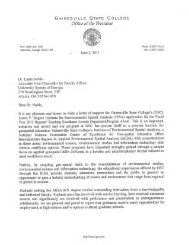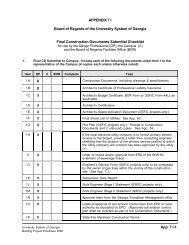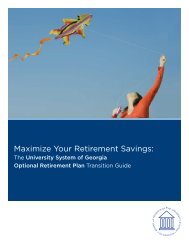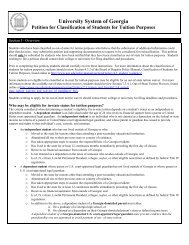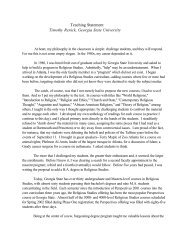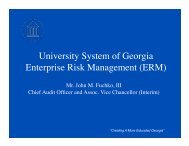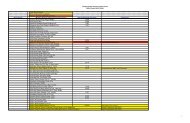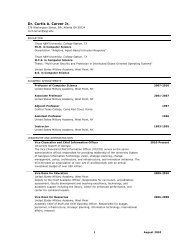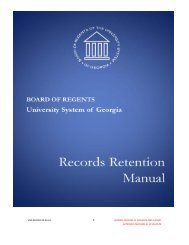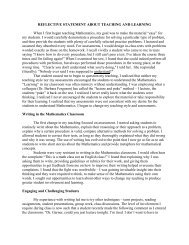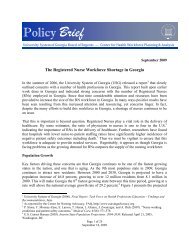WReier-Aviles on DSKGBLS3C1PROD with RULES266882 Federal Register / Vol. 75, No. 209 / Friday, October 29, 2010 / Rules and Regulationscalendar dates rather than paymentperiod completion. One commenterstated that these ‘‘scheduled satisfactoryacademic progress calculation’’ periodscould then be used as the basis for thestudent’s continued receipt <strong>of</strong> aid orplacement on financial aid warning.This commenter also suggested that werevise § 668.34 to make the financial aidwarning status available to thoseinstitutions with nonterm programs thatevaluate student academic progressmore frequently than annually but notin conjunction with payment periods.The commenter expressed that muchconfusion will result if the <strong>Department</strong>does not address how institutions withnonterm programs, where the annualreview date chosen for SAP review doesnot coincide with a payment period, cancomply with these regulations.Another commenter stated that the<strong>Department</strong> should consider studyingdifferent instructional delivery modelsin order to determine how to bestregulate accountability for institutionsthat need to evaluate SAP for studentsin nonstandard programs.Discussion: The <strong>Department</strong>recognizes the complicated monitoringthat institutions with nonterm andnonstandard term programs will need toimplement to comply with § 668.34 forevaluating the academic progress <strong>of</strong>students in these programs, if theychoose to evaluate SAP on a paymentperiod-by-payment period bases. This isbecause, for these programs, institutionscould have students completingpayment periods on a daily basis. Weunderstand why institutions may find iteasier to set one particular calendar dateto evaluate the SAP <strong>of</strong> all <strong>of</strong> theirstudents in these programs. However,we do not believe that this approachwill work because on any given date,any particular student could be at thebeginning, middle, or end <strong>of</strong> a paymentperiod. The SAP review must accountfor completed coursework, and studentsin the middle <strong>of</strong> a payment period, forexample, might still have days or weeksto go to finish that work. We do believethat the institution could set a particulartime period when it evaluates SAP forall <strong>of</strong> its students. For example, theinstitution could set a policy that SAPevaluation will occur for all studentsupon the completion <strong>of</strong> the paymentperiod in a given month(s). Theevaluation would then include all <strong>of</strong> thecoursework that an individual studentcompletes for the payment periodcompleted in that month. We do notbelieve that evaluating students at anymoment in time other than at the end <strong>of</strong>a payment period is an appropriatemeasure <strong>of</strong> the student’s currentprogress towards program completion,as it is not generally possible to evaluatethe work in progress. By evaluating all<strong>of</strong> the most recently completed work, aSAP evaluation will be most accurate inportraying a student’s progress, and willenable the institution to evaluate SAPprior to making the payment for the nextpayment period thereby insuringpayments only to eligible students. Wehave, therefore, made a change to theproposed regulations to clarify that theevaluation must occur at the end <strong>of</strong> apayment period. With regards to thecommenter who suggested that the<strong>Department</strong> should conduct a study inorder to determine the best way toregulate accountability for students innontraditional programs, we will takethis recommendation under advisement.Changes: We have revised§ 668.34(a)(3)(ii) to provide that, forprograms longer than an academic yearin length, satisfactory academic progressis measured at the end <strong>of</strong> each paymentperiod or at least annually to correspondto the end <strong>of</strong> a payment period.Comment: Two commenters notedthat the proposed SAP regulations donot address students with disabilitiesand their needs, especially during theappeals process, as such students mayneed several appeals.Discussion: When evaluating astudent appeal under § 668.34, aninstitution may take into considerationfactors that could have affected thestudent’s academic progress. Thesefactors can include whether the studenthas a disability or other extenuatingcircumstances. Additionalconsiderations may also be given in anacademic plan for a student who has adisability as long as applicable title IV,HEA program requirements arefollowed. Therefore, we do not believethat it is necessary to include anyadditional regulatory language onevaluating the SAP <strong>of</strong> students withdisabilities or the appeals process forthose students.Changes: None.Comment: One commenter, whoexpressed concern that the proposedSAP regulations were cumbersome,asked whether the regulations wouldpermit two specific types <strong>of</strong> situations.First, the commenter asked whether aninstitution could retain the ability toutilize the financial aid warning statusif its SAP policy stated that it wouldbegin monitoring a student’s academicprogress after the student’s firstacademic year, and then continue tomonitor the student’s progress everypayment period thereafter. Second, thecommenter asked whether a studentcould continue to receive title IV, HEAaid without further appeal if the studentis in financial aid warning status and heVerDate Mar2010 14:10 Oct 28, 2010 Jkt 223001 PO 00000 Frm 00052 Fmt 4701 Sfmt 4700 E:\FR\FM\29OCR2.SGM 29OCR2or she submits, and continues to meetthe terms <strong>of</strong>, an acceptable academicplan.Discussion: The proposed regulationsallow for significant flexibilities forinstitutions. If the institution wishes tomonitor at different periods in time,such as at the end <strong>of</strong> the first year, andthen by payment period after that, it isfree to do so. In this situation, onlythose students who are evaluated eachpayment period may receive theautomatic financial aid warning status.With regard to the second scenariodescribed by the commenter, a studentwho has appealed a determination thathe or she is not meeting satisfactoryacademic progress and is attending hisor her program under an approvedacademic plan because he or she is onfinancial aid warning status remainseligible for title IV, HEA aid as long ashe or she continues to meet theconditions <strong>of</strong> that plan. In such asituation, the student’s academicprogress would simply be re-evaluatedat the same time as the institution’sother title IV, HEA aid recipients areevaluated, unless its policy called for adifferent review period.Changes: None.Comment: One commenter noted thatat his institution summer is considereda trailing term, and the institutionevaluates SAP at the end <strong>of</strong> the springterm. The commenter asked whethersummer coursework could be usedretroactively as part <strong>of</strong> the student’sacademic plan. The commenter alsoquestioned whether the institutioncould state in its SAP policy that itreviews SAP after all work for theacademic year is completed. Under thisapproach, the institution would reviewsome students in the spring and othersafter they complete summer term.Another commenter asked how tohandle an optional summer term.Discussion: An institution may chooseto state in its SAP policy that itmonitors academic progress at the end<strong>of</strong> the student’s completion <strong>of</strong> theacademic year. These SAP regulationsstill leave the flexibility to theinstitution to determine what policywill best serve its students. We note,however, that under an institution’sSAP policy, the institution mustevaluate all <strong>of</strong> the student’s courseworkat some point, and that the financial aidwarning status described in § 668.34(b)is only available to institutions thatevaluate a student’s academic progressevery payment period.If an institution evaluates SAP bypayment period, then it would evaluatea student’s academic progress at the end<strong>of</strong> each payment period that the studentattends. If the institution evaluates SAP
Federal Register / Vol. 75, No. 209 / Friday, October 29, 2010 / Rules and Regulations66883WReier-Aviles on DSKGBLS3C1PROD with RULES2annually, then it would evaluate all <strong>of</strong>the coursework that the student hasattempted and completed since the lastannual evaluation to determine whetherthe student is making satisfactoryacademic progress. There are no periods<strong>of</strong> the student’s attendance that are notconsidered in the evaluation.Changes: None.Minimum GPAComment: One commenter noted that,under current § 668.34(b), a studentmust have a ‘‘C’’ average or its equivalentafter two years in order to makesatisfactory academic progress. Thecommenter noted that the <strong>Department</strong>’sguidance in this area has been that thestudent must have a ‘‘C’’ average or itsequivalent after two years <strong>of</strong> attendance,regardless <strong>of</strong> the student’s enrollmentstatus during that time. The commenterstated that proposed § 668.34(4)(ii)states that the ‘‘C’’ average is required atthe end <strong>of</strong> two academic years. Thecommenter asked the <strong>Department</strong> toclarify whether the use <strong>of</strong> the phrase‘‘two academic years’’ as opposed to thephrase ‘‘two years’’ results in anysubstantive change in how the<strong>Department</strong> interprets this requirement.Another commenter stated that thecurrent regulations are sufficient in thisarea, because they allow institutions tointerpret the phrase ‘‘two years’’ in theway that is best for their students.Discussion: The term ‘‘academic year’’is used in section 484(c)(1)(B) <strong>of</strong> theHEA, which states that a student isconsidered to be maintainingsatisfactory academic progress if thestudent has a cumulative ‘‘C’’ average, orits equivalent or academic standingconsistent with the requirements forgraduation, as determined by theinstitution, at the end <strong>of</strong> the secondsuch academic year. We changed thereference from ‘‘year’’ to ‘‘academic year’’in § 668.34 to more closely align thisregulatory language with thecorresponding statutory language. Thischange, however, does not alter the<strong>Department</strong>’s interpretation that thisrequirement means that a student musthave a ‘‘C’’ average or its equivalent aftertwo years <strong>of</strong> attendance, regardless <strong>of</strong>the student’s enrollment status.Changes: None.PaceComment: Two commenters notedthat proposed § 668.34(a)(5)(ii) statesthat an institution is not required toinclude remedial coursework whendetermining the attempted andcompleted hours for purposes <strong>of</strong>evaluating a student’s pace towardcompletion <strong>of</strong> the program. Bothcommenters requested clarification thatan institution may, but is not requiredto, include remedial coursework whenmaking its SAP determination.Discussion: It is the <strong>Department</strong>’slongstanding position that an institutionis not required to include remedialcourses when calculating the student’sprogress towards program completion.While an institution is not required toinclude remedial courses whencalculating pace under the SAPanalysis, it may do so as long as its SAPpolicy otherwise meets the requirementsin § 668.34.Changes: None.Comment: One commenter, whonoted that its students enter a programat multiple points during the year, askedthe <strong>Department</strong> to clarify how tocalculate a student’s ‘‘pace’’ towardprogram completion under proposed§ 668.34(a)(5)(ii). This commenter alsoasked whether full time or part timeenrollment should be used to calculatepace toward completion under theseregulations. Another commenter askedthe <strong>Department</strong> to clarify how pacerelates to maximum timeframe underthese regulations. This commenterquestioned whether a time component<strong>of</strong> weeks or months to programcompletion needed to be part <strong>of</strong> thepace measurement. Another commenterexpressed concern that proposed§ 668.34(a)(5) is less clear than a strictpercentage <strong>of</strong> completion policy. Thiscommenter, who came up with a 67percent minimum required completionrate when applying the pace formulaand the maximum timeframerequirements to the normal BAgraduation requirements, argued thatthe <strong>Department</strong> should revise theregulations to list the minimumcompletion rate that would allow astudent to complete his or her programin a 150 percent maximum timeframe(67 percent completion in thecommenter’s calculation).This commenter also stated that anyinstitution that had a stricter thanminimum SAP policy, such as higherrequired completion rates, should beallowed to use the financial aid warningstatus, even if it only checked SAP onan annual basis. The commenter statedthat this would allow those institutionswith stricter policies and highcompletion rates to use the flexibility<strong>of</strong>fered through the use <strong>of</strong> the financialaid warning status.Discussion: Proposed § 668.34(a)(5)(i),together with the definition <strong>of</strong>maximum timeframe in § 668.34(b),defines ‘‘pace’’ for purposes <strong>of</strong> SAPevaluations; it is the pace at which astudent must progress through his or hereducational program to ensure that thestudent will complete the programVerDate Mar2010 14:10 Oct 28, 2010 Jkt 223001 PO 00000 Frm 00053 Fmt 4701 Sfmt 4700 E:\FR\FM\29OCR2.SGM 29OCR2within the maximum timeframe andprovides for measurement <strong>of</strong> thestudent’s progress at each SAPevaluation. Proposed § 668.34(a)(5)(ii)provides the formula that an institutionmust use at each SAP evaluation tocalculate pace: divide the cumulativenumber <strong>of</strong> hours the student hassuccessfully completed by thecumulative number <strong>of</strong> hours the studenthas attempted. This calculation is to beused regardless <strong>of</strong> the student’senrollment status, as the formula isdesigned to measure completionappropriately for each studentregardless <strong>of</strong> whether that studentattends full time or part time. The<strong>Department</strong> believes that theserequirements for measuring pace towardprogram completion provide maximumflexibility for both students andinstitutions. Students are free to attendat whatever enrollment status isappropriate for them, and institutionscan measure the pace as appropriate fortheir students. Because a graduated pacestandard (i.e., 50 percent the first year,60 percent the second year, and 70percent every year thereafter) ispermissible, the <strong>Department</strong> does notbelieve it is appropriate to regulate aspecific completion rate for all studentsin all programs at all institutions.Changes: None.Transfer CreditsComment: Several commenters statedthat, for purposes <strong>of</strong> calculating pacetoward program completion under§ 668.34(a)(5), transfer credits shouldonly count in the completed hourscategory, but not the attempted hourscategory, because those credits were nottaken at the institution determiningSAP. Another commenter stated thattransfer credits should only be countedin the attempted hours category but notthe completed hours category. Onecommenter requested clarification as towhether the requirement in§ 668.34(a)(6) to count transfer credits asboth attempted and completed meansthat institutions are required to requestand evaluate all applicable transcripts.Discussion: Whether or not aninstitution evaluates the transcripts <strong>of</strong>all coursework taken by a student atprevious institutions is a decision left tothe institution. The <strong>Department</strong> has notrequired institutions to requesttranscripts for previously completedwork, and is not doing so now.However, in so much as credits taken atanother institution are accepted towardsthe student’s academic program underthe institution’s academic requirements,we do believe it is appropriate toinclude those credits in both theattempted and completed hours
- Page 1 and 2: Friday,October 29, 2010Part IIDepar
- Page 3 and 4: Federal Register / Vol. 75, No. 209
- Page 6 and 7: 66836 Federal Register / Vol. 75, N
- Page 8 and 9: 66838 Federal Register / Vol. 75, N
- Page 10 and 11: WReier-Aviles on DSKGBLS3C1PROD wit
- Page 12 and 13: 66842 Federal Register / Vol. 75, N
- Page 14 and 15: 66844 Federal Register / Vol. 75, N
- Page 16 and 17: WReier-Aviles on DSKGBLS3C1PROD wit
- Page 18 and 19: 66848 Federal Register / Vol. 75, N
- Page 20 and 21: 66850 Federal Register / Vol. 75, N
- Page 22 and 23: WReier-Aviles on DSKGBLS3C1PROD wit
- Page 24 and 25: 66854 Federal Register / Vol. 75, N
- Page 26 and 27: WReier-Aviles on DSKGBLS3C1PROD wit
- Page 28 and 29: 66858 Federal Register / Vol. 75, N
- Page 30 and 31: 66860 Federal Register / Vol. 75, N
- Page 32 and 33: 66862 Federal Register / Vol. 75, N
- Page 34 and 35: 66864 Federal Register / Vol. 75, N
- Page 36 and 37: 66866 Federal Register / Vol. 75, N
- Page 38 and 39: WReier-Aviles on DSKGBLS3C1PROD wit
- Page 40 and 41: WReier-Aviles on DSKGBLS3C1PROD wit
- Page 42 and 43: 66872 Federal Register / Vol. 75, N
- Page 44 and 45: WReier-Aviles on DSKGBLS3C1PROD wit
- Page 46 and 47: WReier-Aviles on DSKGBLS3C1PROD wit
- Page 48 and 49: WReier-Aviles on DSKGBLS3C1PROD wit
- Page 50 and 51: 66880 Federal Register / Vol. 75, N
- Page 54 and 55: 66884 Federal Register / Vol. 75, N
- Page 56 and 57: 66886 Federal Register / Vol. 75, N
- Page 58 and 59: WReier-Aviles on DSKGBLS3C1PROD wit
- Page 60 and 61: WReier-Aviles on DSKGBLS3C1PROD wit
- Page 62 and 63: WReier-Aviles on DSKGBLS3C1PROD wit
- Page 64 and 65: WReier-Aviles on DSKGBLS3C1PROD wit
- Page 66 and 67: WReier-Aviles on DSKGBLS3C1PROD wit
- Page 68 and 69: WReier-Aviles on DSKGBLS3C1PROD wit
- Page 70 and 71: WReier-Aviles on DSKGBLS3C1PROD wit
- Page 72 and 73: 66902 Federal Register / Vol. 75, N
- Page 74 and 75: WReier-Aviles on DSKGBLS3C1PROD wit
- Page 76 and 77: WReier-Aviles on DSKGBLS3C1PROD wit
- Page 78 and 79: 66908 Federal Register / Vol. 75, N
- Page 80 and 81: WReier-Aviles on DSKGBLS3C1PROD wit
- Page 82 and 83: 66912 Federal Register / Vol. 75, N
- Page 84 and 85: WReier-Aviles on DSKGBLS3C1PROD wit
- Page 86 and 87: 66916 Federal Register / Vol. 75, N
- Page 88 and 89: WReier-Aviles on DSKGBLS3C1PROD wit
- Page 90 and 91: WReier-Aviles on DSKGBLS3C1PROD wit
- Page 92 and 93: WReier-Aviles on DSKGBLS3C1PROD wit
- Page 94 and 95: 66924 Federal Register / Vol. 75, N
- Page 96 and 97: WReier-Aviles on DSKGBLS3C1PROD wit
- Page 98 and 99: 66928 Federal Register / Vol. 75, N
- Page 100 and 101: WReier-Aviles on DSKGBLS3C1PROD wit
- Page 102 and 103:
66932 Federal Register / Vol. 75, N
- Page 104 and 105:
WReier-Aviles on DSKGBLS3C1PROD wit
- Page 106 and 107:
66936 Federal Register / Vol. 75, N
- Page 108 and 109:
66938 Federal Register / Vol. 75, N
- Page 110 and 111:
66940 Federal Register / Vol. 75, N
- Page 112 and 113:
66942 Federal Register / Vol. 75, N
- Page 114 and 115:
66944 Federal Register / Vol. 75, N
- Page 116 and 117:
66946 Federal Register / Vol. 75, N
- Page 118 and 119:
WReier-Aviles on DSKGBLS3C1PROD wit
- Page 120 and 121:
WReier-Aviles on DSKGBLS3C1PROD wit
- Page 122 and 123:
WReier-Aviles on DSKGBLS3C1PROD wit
- Page 124 and 125:
66954 Federal Register / Vol. 75, N
- Page 126 and 127:
WReier-Aviles on DSKGBLS3C1PROD wit
- Page 128 and 129:
66958 Federal Register / Vol. 75, N
- Page 130 and 131:
66960 Federal Register / Vol. 75, N
- Page 132 and 133:
WReier-Aviles on DSKGBLS3C1PROD wit
- Page 134 and 135:
WReier-Aviles on DSKGBLS3C1PROD wit
- Page 136 and 137:
WReier-Aviles on DSKGBLS3C1PROD wit
- Page 138 and 139:
66968 Federal Register / Vol. 75, N
- Page 140 and 141:
66970 Federal Register / Vol. 75, N
- Page 142 and 143:
66972 Federal Register / Vol. 75, N
- Page 144 and 145:
66974 Federal Register / Vol. 75, N



